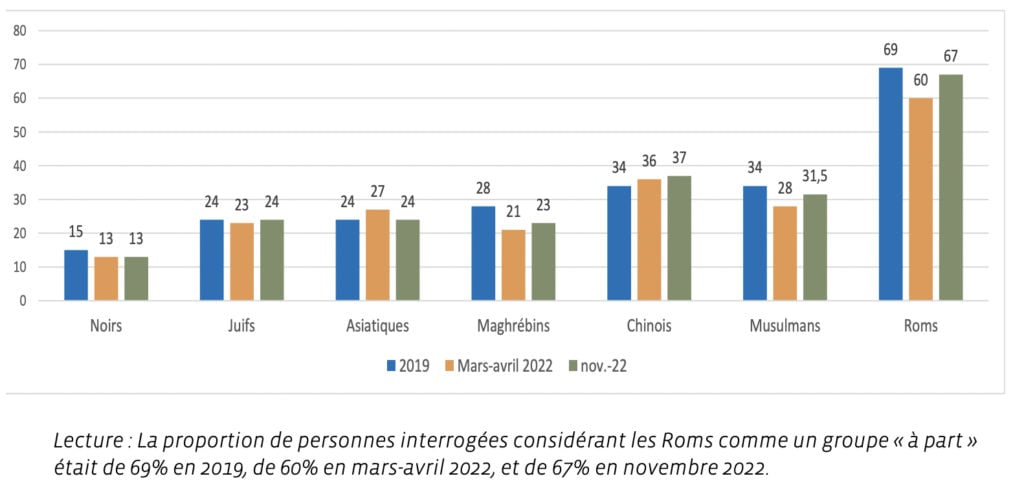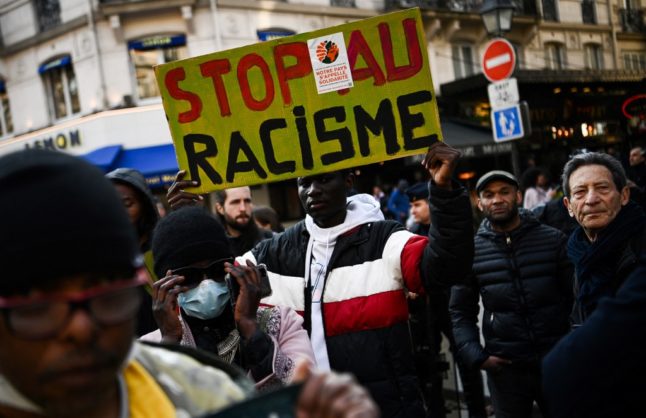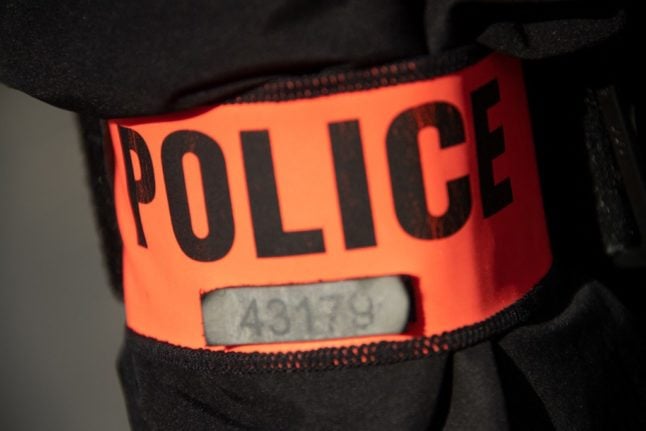The recent nights of rioting that rocked French towns and cities were sparked by an incident of police violence against a teenage French boy of Algerian origin. The anger that followed the death of 17-year-old Nahel was intensified by what seems to be an enduring pattern of police violence towards people of colour, especially young men.
And that’s not the only racial aspect to the social unrest – politicians on the right and far-right have been keen to make a link between the lawless violence of the riots and immigration.
When it was pointed out to the Senate leader of the right-wing Les Républicains party that actually very few rioters were immigrants, and in fact 90 percent of those who were arrested were French citizens, he responded that they were only ‘administratively French’ and the riots represented “a sort of regression towards their ethnic roots”.
His views are far from unique in France, and fuel the sense of some of the young people of colour in France’s poorer neighbourhoods that the country will never truly accept them, even if they, their parents and even their grandparents were born in France.
Talking about race in France is made more complicated by the country’s ‘colour blind’ policy, which means that no official statistics are collected on race, ethnicity or religion. It means that, for example, it is impossible to officially prove or disprove the allegation that French people of colour are far more likely to be stopped by police than their white compatriots.
READ MORE: ANALYSIS: Is France really ‘colour-blind’ or just blind to racism?
But France does, however, publish an annual report into attitudes to race – the national Commission on Human Rights takes stock of both acts of racism and xenophobia, as well as attitudes and behaviours in French society and compares it to previous years.
The report is compiled by combining data from France’s Interior Ministry and Justice Ministry with surveys on public opinion and analyses by research partners.
Here’s what the 2022 report shows;
Opinions
79 percent – The vast majority of those polled either agreed or strongly agreed that a “vigorous fight against racism is necessary in France”. This represents a 20 percentage point increase from polling in 2003. Members of traditionally right wing and far-right parties also agreed with this statement – in fact, 66 percent of respondents who said they were supporters of Marine Le Pen’s Rassemblement National party agreed the “vigorous fight” was necessary, and 64 percent who said they are ‘very right-wing’ said so too.
62 percent – Over half of the respondents said that they are “not at all racist”. Meanwhile, three percent responded saying that they consider themselves to be ‘mostly racist’.
46 percent – Almost half of respondents said that France does not “talk enough about the history of the slave trade”.
Over half – Despite 62 percent of survey respondents saying they were not at all racist, over half – 53 percent – said agreed with the statement “there are too many immigrants in France”. Support for this statement increased by four percentage points when compared with 2021.
37.6 percent – The report found that 37.6 percent of the French public agreed with the statement “Jews have a special relationship with money”.
One-fifth – About a fifth, or 21.4 percent of respondents, said they believe “that the children of immigrants born in France are not really French”.
59.6 percent – Over half of respondents also agreed with the statement that “many immigrants come to France solely to take advantage of social security and protection mechanisms”.
49.3 percent – Anti-Roma sentiments were noticeably high throughout different portions of the survey – almost half of respondents said that they believe “Roma people live mainly from theft and drug trafficking”.
Over two-thirds – 67 percent of respondents referenced the Roma people when describing a minority that is ‘apart from society’ and ‘not open to others’. This was almost double the number of respondents who saw Muslims as a ‘group apart’.

Three-quarters – When looking at traditionally Islamic practices and opinions about whether they can be ‘reconciled with French society’, 75 percent of respondents said that wearing a Burka would ‘pose a problem for living in society. Opinions were a bit more divided regarding the other attire for Islamic women. A total of 42 percent of respondents said that wearing the veil (voile) would pose a problem for living in society, while 45 percent said the same thing for wearing a headscarf (foulard).
Wearing a burka or garment with a full-face veil is currently illegal in France, while wearing a hijab or headscarf is not; although there are certain restrictions on wearing one.

42 percent – Almost half of respondents also said they believe “immigration is the main cause of insecurity” in French society.
Crimes
As well as extensive polling, the study also uses law enforcement data to show the scale of the problems linked to racism and discrimination in France.
1,636 – The total number of racist acts recorded in 2022 in France by law enforcement. This represents a decrease from 2021, when there were 2,128 racist acts recorded. The acts themselves were separated into different categories: anti-Semitic in nature, anti-Muslim, and a general category for “Other racist and xenophobic and xenophobic incidents”.
91 percent – The percentage of people who self-identify as Black who said they are victims of racial discrimination on a daily basis in France. While the survey did not collect this data, it cited it from a previous study by the national organisation representing Black associations in France, which was published in February 2023.
22 percent – Between the years 2019 and 2022, there was a 22 percent increase in the number of anti-Muslim racist actions (from 154 to 188). These include both ‘offences against property’ and ‘offences against people’. About a third of the ‘racist actions’ involved threatening gestures, 19 percent resulted in property damage, and 18 percent involved anti-Muslim inscriptions and graffiti. Physical violence remained in the minority, at seven percent. When it came to locations, Muslim places of worship remained the primary target for hate actions.
44 – Out of 188 of the anti-Muslim actions recorded in 2022, 44 happened in the greater Paris Île de France region. After that, Hauts-de-France recorded 24 incidents and Auvergne-Rhône-Alpes recorded 23 incidents.
436 – The total number of anti-Semitic offences recorded in 2022, which represents a 26 percent decrease when compared to 2021 when 589 actions were recorded. Nevertheless, anti-Semitic actions remained a large share of the total number of discriminatory actions in France, representing almost a third (27 percent).
8,195 – Overall, French law enforcement recorded 8,195 charges of ‘public incitement to racial hatred, racial discrimination or religious discrimination in 2022.
77 percent – Of the victims of crimes committed due to ethnicity, race or religion, 77 percent held French nationality.



 Please whitelist us to continue reading.
Please whitelist us to continue reading.
Member comments